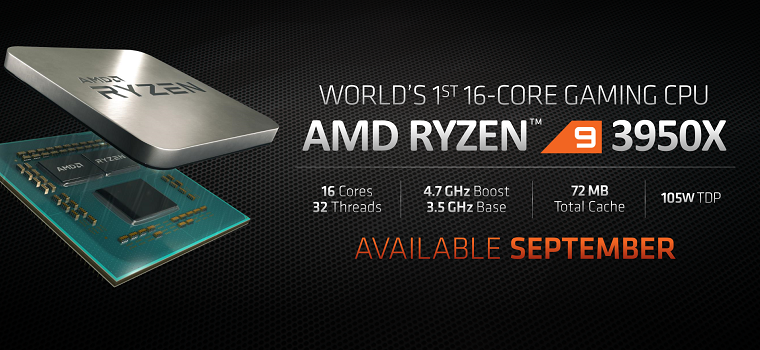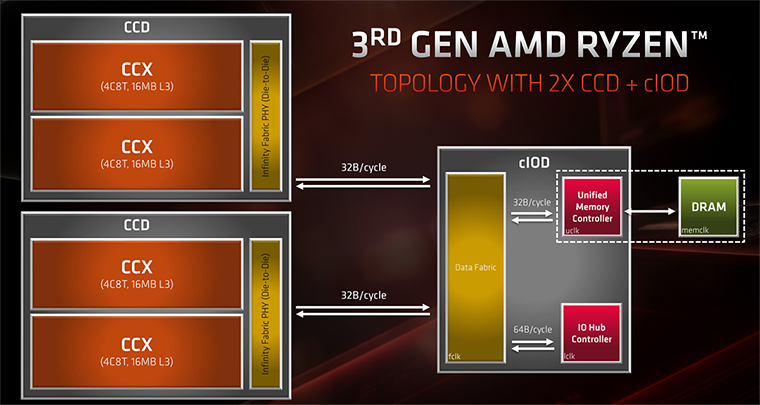It was curious to see AMD introduce five Ryzen 3000-series processors at Computex 2019 - from the 6C12T Ryzen 5 3600 through to the 12C24T Ryzen 9 3900X - based on the all-new Zen 2 architecture, but leave its champion product unannounced. We are, of course, talking of the 16-core, 32-thread part conspicuous by its absence.
Said CPU's inevitable introduction makes implicit sense if you appreciated how AMD builds these chips. Ryzen 3000-series processors use either one or two core complex designs (CCDs) and an attendant I/O (cIOD) die, and each CCX is home to up to eight cores. In that respect, CCXs haven't changed over generations. Now, simple maths tells us that a fully-core-enabled dual-CCX chip ought to have that 16C32T topology. Those who follow rumour sites have undoubtedly seen the leaks, right?
The only sensible reason to hold such a chip back is to see if the competition, Intel, has anything up its silicon sleeve to combat such a mainstream monster. It doesn't, so preamble over, let's introduce the Ryzen 9 3950X.
Turning on the performance tap
AMD and Intel usually resort to two strategies when building massive-core chips. They either increase the power budget over incumbents, to serve the greater number of cores well, or reduce the frequencies, oftentimes by a decent margin, to accommodate increased core parallelism.
AMD, however, in the knowledge that supporting motherboards aren't all rated for >105W processors, keeps the Ryzen 9 3950X's power budget at that 105W. So, it would seem that frequencies ought to drop quite handsomely over the already-announced Ryzen 9 3900X?
AMD Ryzen product range | ||||||||||
|---|---|---|---|---|---|---|---|---|---|---|
| Model |
Cores / Threads
|
TDP
|
L3 Cache
|
Base Clock
|
Turbo Clock
|
Process
|
PCIe
|
DDR4 Support
|
Package
|
Price
|
| AMD Ryzen 9 | ||||||||||
| Ryzen 9 3950X |
16 / 32
|
105W
|
64MB
|
3.5GHz
|
4.7GHz
|
7nm
|
24
|
Dual 3200
|
AM4
|
$749
|
| Ryzen 9 3900X |
12 / 24
|
105W
|
64MB
|
3.8GHz
|
4.6GHz
|
7nm
|
24
|
Dual 3200
|
AM4
|
$499
|
| AMD Ryzen 7 | ||||||||||
| Ryzen 7 3800X |
8 / 16
|
105W
|
32MB
|
3.9GHz
|
4.5GHz
|
7nm
|
24
|
Dual 3200
|
AM4
|
$399
|
| Ryzen 7 3700X |
8 / 16
|
65W
|
32MB
|
3.6GHz
|
4.4GHz
|
7nm
|
24
|
Dual 3200
|
AM4
|
$329
|
| Ryzen 7 2700X |
8 / 16
|
105W
|
16MB
|
3.7GHz
|
4.3GHz
|
12nm
|
24
|
Dual 2933
|
AM4
|
$329
|
| Ryzen 7 2700 |
8 / 16
|
65W
|
16MB
|
3.2GHz
|
4.1GHz
|
12nm
|
24
|
Dual 2933
|
AM4
|
$299
|
| Ryzen 7 1800X |
8 / 16
|
95W
|
16MB
|
3.6GHz
|
4.0GHz
|
14nm
|
24
|
Dual 2666
|
AM4
|
$349
|
| Ryzen 7 1700X |
8 / 16
|
95W
|
16MB
|
3.4GHz
|
3.8GHz
|
14nm
|
24
|
Dual 2666
|
AM4
|
$309
|
| Ryzen 7 1700 |
8 / 16
|
65W
|
16MB
|
3.0GHz
|
3.7GHz
|
14nm
|
24
|
Dual 2666
|
AM4
|
$299
|
| AMD Ryzen 5 | ||||||||||
| Ryzen 5 3600X |
6 / 12
|
95W
|
32MB
|
3.8GHz
|
4.4GHz
|
7nm
|
24
|
Dual 3200
|
AM4
|
$249
|
| Ryzen 5 3600 |
6 / 12
|
65W
|
32MB
|
3.6GHz
|
4.2GHz
|
7nm
|
24
|
Dual 3200
|
AM4
|
$199
|
| Ryzen 5 2600X |
6 / 12
|
95W
|
16MB
|
3.6GHz
|
4.2GHz
|
12nm
|
24
|
Dual 2933
|
AM4
|
$229
|
| Ryzen 5 2600 |
6 / 12
|
65W
|
16MB
|
3.4GHz
|
3.9GHz
|
12nm
|
24
|
Dual 2933
|
AM4
|
$199
|
| Ryzen 5 1600X |
6 / 12
|
95W
|
16MB
|
3.6GHz
|
4.0GHz
|
14nm
|
24
|
Dual 2666
|
AM4
|
$219
|
| Ryzen 5 1600 |
6 / 12
|
65W
|
16MB
|
3.2GHz
|
3.6GHz
|
14nm
|
24
|
Dual 2666
|
AM4
|
$189
|
| Ryzen 5 2400G |
4 / 8
|
65W
|
4MB
|
3.6GHz
|
3.9GHz
|
14nm
|
16
|
Dual 2933
|
AM4
|
$169
|
| Ryzen 5 1500X |
4 / 8
|
65W
|
16MB
|
3.5GHz
|
3.7GHz
|
14nm
|
24
|
Dual 2666
|
AM4
|
$174
|
| Ryzen 5 1400 |
4 / 8
|
65W
|
8MB
|
3.2GHz
|
3.4GHz
|
14nm
|
24
|
Dual 2666
|
AM4
|
$169
|
| AMD Ryzen 3 | ||||||||||
| Ryzen 3 2200G |
4 / 4
|
65W
|
4MB
|
3.5GHz
|
3.7GHz
|
14nm
|
16
|
Dual 2933
|
AM4
|
$99
|
| Ryzen 3 1300X |
4 / 4
|
65W
|
8MB
|
3.5GHz
|
3.7GHz
|
14nm
|
24
|
Dual 2666
|
AM4
|
$129
|
| Ryzen 3 1200 |
4 / 4
|
65W
|
8MB
|
3.1GHz
|
3.4GHz
|
14nm
|
24
|
Dual 2666
|
AM4
|
$109
|
This rather lengthy complete table shows that AMD does indeed reduce the base frequency, down to 3.5GHz, though claims a low-core boost speed of 4.7GHz, all the while driving more power-hungry cache. Impressive.
Having a 16C32T part on the established, mainstream AM4 platform does a few things. It questions the need for genuine content creators to look at either the Intel X299 (Core-X) or AMD TR4 (Threadripper) platforms; it enables users with older Ryzen-compatible boards to upgrade to monster performance without changing the platform, and it brings per-core value into focus.
AMD is set to introduce the Ryzen 9 3950X in September for $749. We'll have it on the HEXUS test bench as soon as possible. Stay tuned.








